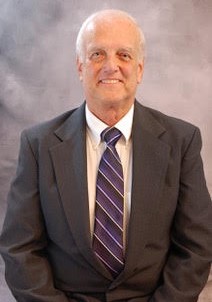
BY DEBBIE PAGE
debbiepage.iredellfreenews@gmail.com
Troutman Town Council member and Mayor Pro Tem Paul Henkel is finishing his 32nd year of service in varoius capacities to the town, and he is eager to to continue serving for four more years.

Before his retirement, Henkel spent his career working in sales and marketing related to the steel industry in Hickory and Charlotte areas. He earned his bachelor’s degree from Catawba College in Salisbury.
In addition to his years on council since first being appointed to a seat in 1976, Henkel also has served on Troutman’s Planning and Zoning Board and other town committees.
He was on the Board of Directors for the Statesville/Barium Springs YMCA and volunteered with the food back pack ministry for Troutman Elementary School for several years. He has also been a member of the Lions and Rotary Clubs and volunteered with the H.E.L.P. ministries food pantry distribution program.
Henkel has been active for decades at Holy Trinity Lutheran Church, serving on church council, various committees, and teaching Sunday School.
IMPROVING ECONOMIC OPPORTUNITIES
With its favorable proximity to two interstates, Troutman has economic advantages for businesses and industries that choose to locate here. Henkel cites the council’s work with the Iredell County Economic Development Corporation for bringing more economic expansion to improve the town’s tax base.
He also cited ads in business recruitment-related periodicals and work with the Charlotte Business Partnership for bringing more business activity. Henkel also touted the “good old-fashioned word of mouth that Troutman is welcoming to large and small businesses that are an asset to the community.”
“All of this goes along with the idea of providing products, services, and jobs to our town and surrounding region,” the councilman said.
Henkel also wants to continue to attract more businesses and services to Troutman through a business-friendly environment with fewer onerous rules and providing zoning assistance as well as town grants to assist small business owners in developing their ventures. Providing incentives to attract large businesses is also necessary, he said.
Henkel also pointed to two funds the council established to assist in economic development several years ago.
Henkel noted that the council wants to refurbish its 153 Wagner Street property for business development and “set the template for an attractive and vibrant downtown.” The second-floor apartments also continue to provide revenue for the town, Henkel added.
Henkel also favors using economic grants to entice other vacant building owners to encourage improvement to attract business tenants or buyers.
“The Strategic Master Plan is a roadmap for continuing growth and improvement and should be constantly be used as a measure for our performance level,” he said.
Henkel is excited about the new town website as a vehicle to attract more businesses to town. The updated and expanded information from all departments provides valuable information to those thinking about coming to the area.
MANAGING GROWTH
Troutman’s growth necessitated hiring additional employees to provide services to residents, which in turn created overcrowded conditions at Town Hall.
“Our administrative staff is expanding in relation to our town growth in order to continue providing a high level of service to our citizens that they deserve,” Henkel said.
The council recently voted to buy four parcels and two houses next to Town Hall as well as three properties on Wagner Street. Henkel supports converting the houses just across the street to office use.
However, Henkel also hopes the town can build a new Town Hall eventually, which may be more cost-effective and meet modern technology demands for employees’ work efficiency.
If the administration moves into other quarters, Henkel said that the “police department, in order to maintain acceptable levels of standards and performance, could possibly be located here at Town Hall by itself.”
The properties have “all been paid for through allocations from our fund balance and through low- interest loans,” added Henkel.
As Troutman grows, current residents are concerned about losing its small-town charm. Henkel admitted “that is one of the hardest tasks for any council of a small town to figure out and accomplish.”
“You try to plan with your long-range land-use plan and strategic plan while dealing with property owners’ ideas of what they want to do with their own property, in addition to residential and commercial developers who also have their own agenda.”
“You have to balance those factors with the knowledge that with every housing development and commercial enterprise that locates in Troutman, it becomes a little larger, both structurally and in population.”
“This makes the small-town atmosphere harder and harder to maintain overall. However, by promoting a vibrant downtown, quaint and attractive, with quality of life activities as well as pockets of areas in the general town limits geared toward people’s best interests, health, recreation and social activities, this contributes to the continuation of that feeling.”
Henkel noted that to bring the goods and services into town that citizens want, growth is inevitable.
He also hopes to see more cultural and entertainment venues to supplement activities at ESC Park.
Though some talk of building sewer or water plants to meet growth demands has occurred, Henkel said it makes no economic sense for a small town like Troutman. A previous engineering study indicated the cost was too prohibitive, even with government grants.
Henkel feels partnering with area towns for these services is cost efficient and follows state guidance to regionalize such services to minimize environmental impact. The town has built its own efficient water and sewer delivery system that keeps rates competitive and provides effective services to customers.
TRAFFIC ISSUES
Roads and traffic are also a growing concern for residents, though much of the problem is on state-maintained roads out of town control. “The state road network is theirs. We can advise and suggest, but it’s up to the state to work with us.”
“We continue to maintain our town-owned streets to provide our citizens and the driving public at large a comfortable, efficient, and functional means to travel,” he said.
“We continue to communicate and work with NCDOT to bring their network of roads and highways up to levels to allow traffic to better maneuver around and through town at all times of the day.”
Henkel noted a series of broken promises by the state, including Highway 21/Main Street expansion slated for 2023 that has now been delayed to 2029.
He noted the decades-long struggle to get a traffic signal at Walgreens/Old Murdock intersection, which the town even offered to pay for in the 1990s but were refused by the state. He is also concerned about increasing Talley Street traffic and its intersection with Highway 21.
Five schools operate in Troutman, which triples traffic on school days. “The school system has been great to work with our police department in setting up patterns of travel for parents bringing and picking up their children from school,” Henkel said.
If re-elected, Henkel hopes he can assist council in implementing more of the 2018 Strategic Master Plan over the next four years. He wants to focus on downtown revitalization, continuing improvements in walking and bike opportunities through additional sidewalk and greenway construction, and establishing pocket parks throughout town.
ENGAGING CITIZENS
Henkel believes transparency in government operation and decision-making is important. During his latest eight-year stint on council, Henkel said they have “striven to be open and transparent. We discuss and make decisions in open meetings, and our town staff is open and willing to explain any question and concern citizens may have.”
Council members are also open to citizens. “We do our best to keep the public informed through the news media, the town’s Whistle Stop newsletter, and electronic signs.”
“Our goal is to interest people, as many as possible, in getting involved with their town government through volunteerism, on boards, and on committees for various functions. All are important and necessary to getting the job done and serve our citizens.”
Henkel hopes that through town social media accounts from various departments, speaking to community groups, reaching out in daily interactions, and contacting representatives of various groups for discussion and dialogue, the town and council will continue to enhance community engagement.
He is open to a serious conversation with council members and residents about changing to a district voting format to make sure the concerns of citizens from all parts of town are heard.
PUBLIC SAFETY
Henkel praised Troutman’s low crime rate. “This is due to a watchful citizenry and a police department that provides dedicated officers to protect and serve us. Our schools are protected with one or two school resource officers to protect our students and staff.”
The FLOCK cameras have also been helpful to locate suspects and warn of criminals’ presence in the community.
FINAL PITCH
Henkel says he brings “many years of service, experience, and knowledge of what has worked in the past and what has not. I try to bring a temperament of looking at all sides of an issue for the best solution and benefit to the town and its system.”
“I serve currently as Mayo Pro Tem and would bring many years of knowledge to serve in town leadership should that position become temporarily vacant and needed filling at a moment’s notice.”
“My goals are to continue to provide adequate infrastructure for Troutman ’s current residents and future ones as the town grows. This infrastructure includes both utilities and town human resources to fill vital positions to carry out the operations of the town.”
“Continued planning with NCDOT for an effective and adequate road network is also necessary, though anguishingly slow.”
Henkel also said that he favors the “continued application for and securing of grants, which is important in these endeavors and makes more affordable the achievement of goals and saving of taxpayers’ money while contributing to an ever improving quality of life.”



